Major gift priorities
Our vision for education and ministry has led—and continues to lead us—toward an educational model that supports and celebrates the universal ministry of all believers. Throughout our history and today, we:
- Encourage all persons equally in ministry.
- Emphasize intellect, spirituality and practice as essential components of a seminary education.
- Inspire ministers and religious leaders to confront the challenges of a changing world, rather than insisting they hold on to the past.
As a Christian school grounded in the Quaker tradition, ESR is uniquely situated to prepare persons for the type of leadership and ministry required in today’s world – the type where Quaker values, beliefs and practices provide the foundation and framework for creating leaders who possess spiritual depth, model responsible faith, and can offer faithful ministry in this time of change. To do this, we need philanthropic friends to support strategic fundraising initiatives that focus on:
- Entrepreneurial ministry
- Christian spirituality
- Cross-cultural ministry
- Pastoral care
- Pastoral ministry
- Peace studies
- Technology and ministry
We have been both strategic and prayerful in developing a course of action to turn our vision into reality. These priorities are essential to distinguishing our place in education and ministry, and to continuing to prepare and support those who are called to serve God. We invite you to explore these priorities and hope that you are moved to support them.
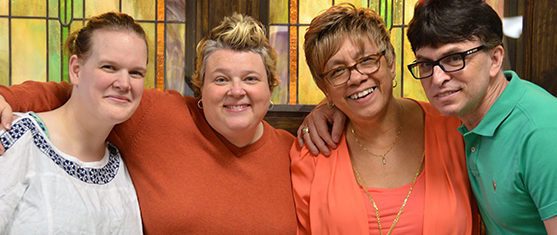
Entrepreneurial ministry
“I am confident in this, that the one who began a good work among you will bring it to completion.” – Philippians 1:6
We have increasingly felt it is critical to address the significant barrier to financial wellbeing in ministry that the ongoing erosion of traditional institutional support has meant for post-seminary careers. Emerging out of our own research as well as feedback we received from our students and graduates, Our innovative and entrepreneurial ministry programming is our attempt to answer this need – providing training, peer support, and financial means within a Quaker seminary context to those who seek to answer calls to ministry that are not housed within existing institutions. But we need your help to keep these programs going. We hope you are willing to take the time to read this brief overview of our important work.
In July of 2017, Earlham School of Religion launched a trial certificate program in entrepreneurial ministry with financial support from The Lilly Endowment. Twelve participants (8 seminary graduates and 4 current students) comprised this initial cohort. After the initial 6 months, students who produced a ministry canvas, budget and identified next steps were eligible for a $5,000 grant to support the ministry launch (and a second grant of $3,500 six months later). Participants who complete this program receive a Certificate in Entrepreneurial Ministry. For those who are active students, these courses also earn credit toward the Master of Divinity degree. For the trial program, no tuition was charged for students not seeking academic credit, and travel and lodging expenses were covered. Eight of the 12 completed the program this August and presented their projects at ESR’s annual Leadership Conference.
The greatest impact for this grant period has been with the entrepreneurial cohort. They are moving forward with ministries which are well-suited to their gifts and interests but not necessarily supported by institutional structures. Finding courage to step out into ministry has been a huge component, as has been the value of a community of support, which these individuals say had been lacking for them. Below are brief bios of our first Entrepreneurial Ministry Certificate students and descriptions of their projects. We think you will be inspired by what you read, but first here is a short video highlighting their projects:
Abbey Pratt-Harrington
Since graduating from two Quaker Colleges, Wilmington for her bachelor’s and ESR for her Master of Divinity, Abbey has kept active in the Quaker world. She’s recently finished a four-year stint at Earlham College working with both the Quaker Fellows, and Bonner programs. She has now moved into the creation of her ministry Divine Journey, a spiritual direction and tarot practice. When not working, she volunteers with various organizations, reads, and bakes.
Adriana Cabrera-Velásquez
Adriana Cabrera-Velásquez is a Colombian Quaker, Earlham School of Religion M.Div., Literary Studies BA, translator, interpreter, and peace & justice worker. Her experience includes work in Quaker education and international accompaniment organizations such as Olney Friends School, Beacon Hill Friends House, and Christian Peacemaker Teams. After many years of work abroad, Adriana settled at home in Paipa, Colombia, to focus her efforts locally. Currently she participates in ESR´s Entrepreneurial Ministry Certificate Program; her project, El Costurero Ciclo Café, is a bicycle coffee shop where women-farmed coffee and cycling become avenues for women empowerment, health, and a wholesome community life.
Andy Henry
Andy lives in a small town called Mt. Gilead, Ohio, and works at a local public library. He is a member of the Friends of Jesus Fellowship and a recent graduate of Earlham School of Religion. In his free time, Andy enjoys reading, writing, coffee shops, backyard gardening, and tending to his dancing chickens. His ministry interests are focused on the renewal of rural churches and communities. Learn more about his work, thought, and ministry resources here.
Jaimie Mudd
Jeanne-Marie owns Watershed Ways providing spiritual nurture, life and business coaching. She also offers services for organization design, community development, coalition building and strategic planning in the nonprofit and public sector. Over these past ten years she has led Circle of Trust, Friends Couple Enrichment and other retreats for faith communities. She has been leading workshops on Communal Discernment with Friends Meetings. Now in her 27th year as a Convinced Friend, and a member of Pima Friends Meeting in Tucson, Arizona, she brings a disciplined Christian practice to 21st century faith communities and has a deep wellspring of faith, tradition and creativity that informs her life and work.
Julia Soriano
In her workshops, presentations and writing, Julia shares her own story of overcoming grief and blinding uncertainty when she had to stop working full-time due to a serious medical condition. Her story includes starting a small business selling cookie dough, going to ESR for her third master’s degree and earning the Mullen Ministry of Writing Fellowship while there. Her company, Sharp Turn Institute, gives others a course for creating a strategy to address their own unique trials. While devoted to creating tools to flourish, the ultimate goal is to help people find paths to active, meaningful lives.
Oscar Malande
Oscar Lugusa Malande has served among Friends in Vihiga Yearly Meeting in Kenya both as a pastor and chaplain for twelve years. He taught and served as registrar and assistant academic dean at Friends Theological College, Kaimosi for three years. He is a recent graduate in Master of Arts from Earlham School of Religion and currently teaches at FTC. He is married to Zipporah Adema Mileha and they are blessed with four children. Oscar is using agriculture as a model for bi-vocational ministry and community transformation.
Summer Cushman
Summer is a Quaker minister, visual artist, viniyoga teacher, and yoga therapist. She teaches meditative yoga classes, works with people one-on-one, and teaches a yearlong immersion course based in the ancient texts of yoga both online and in-person. She publishes the Yoga Church Sunday Sermons—a free weekly sermon delivered to your inbox. Summer will begin offering an annual Yoga Church retreat in 2019. In all her work, Summer is teaching the science of transformation with the ultimate goal of helping people identify the habits that lead to their suffering and—through the mechanism of awareness—learn to transform them.
Theoneste Sentabire
Theoneste Sentabire is from Rwanda, Africa. Currently, he is completing his Masters of Divinity in Leadership at Earlham School of Religion where he graduated with an MA in Peace Studies two years ago. He also holds a Bachelor of Theology from Friends Theological College, Kenya. Peacemaking is his primary concern. Thus, he have been privileged to be part of the Entrepreneurial Certificate pilot program at ESR this year and received the support necessary to start his own ministry called Blessed Family Ministry (BFM) which promotes a culture of peace making in his village back home.
This entrepreneurial ministry project is generating interest and enthusiasm from alumni/ae. The effort resonates with their experience and many of the questions with which they wrestle. It also resonates with current and prospective students whose calls encourage them to offer ministry and service in unconventional forms and places.
A good example of this is the impact the Entrepreneurial Ministry Certificate had as we developed and implemented our recent Innovation Grant from The Association of Theological Schools. This grant activity is encouraging an innovative spirit within the student body and – equally important – among faculty members as they consider how experiential integration best occurs within the educational programs. In particular, as the faculty engages in a curriculum review, they are encouraging one another to think about cross-disciplinary course offerings and greater experiential engagement with the local community in ways that could reimagine the M.Div. core curriculum.
For current students, this has meant the opportunity to take initial steps this summer toward the kind of full ministry launches our Entrepreneurial Ministry Certificate students have undertaken. These students also presented at our recent Leadership Conference. While these are distinct grant programs at present, my hope is that they can come together under a single umbrella – preparing ESR students for new ministry realities and opportunities, supporting individuals’ efforts to let their lives speak as they put their faith into action. Your gift can help make this happen!
An important distinction between the Certificate and our Innovation Awards, however, was the opportunity the latter provides for greater depth of connection to ESR’s institutional and educational culture. Because the Certificate was designed as a pilot, it was targeted primarily toward M.Div. graduates and relied heavily on outside instructors. The Innovation Grant serves the complementary purpose of capacity building among the current faculty and student body such that a culture of innovation and entrepreneurship is cultivated and the way prepared for a more sustainable and integrated entrepreneurial focus at ESR.
Three ESR professors – Michael Birkel, Ben Brazil, and Jim Higginbotham – are either developing new courses or modifying existing courses to incorporate elements relevant to entrepreneurial ministry.
– Jim’s project is the launch of a new course on community organizing. His course proposal was approved by the Faculty in March. This will run as a blended online/residential class in the spring semester of 2019.
– Michael’s project is a modification of his “New Frontiers in Spirituality” course to include elements on finding spirituality in unexpected places – from Nones to Harry Potter. This ran as a 2-week Intensive class in January 2019.
– Ben’s project involves a new course focused on local community engagement. This will likely run in fall of 2019.
All three professors are also serving as mentors to students who received Innovation Grants.
In late fall, ESR awarded seven students $2,500 Innovation Awards for their entrepreneurial ministry project proposals. These include:
• Windy Cooler, who will test the need for and interest in a Quaker Family Life Ministry among unprogrammed Friends;
• Tom Decker, who plans to explore the potential role cooperatives might serve in peacemaking;
• Nikki Holland, who will assess the need for a healthy families ministry in Merida, Mexico;
• Kaia Jackson, who plans to explore building community through expressive arts, storytelling and/or performance in Richmond, Indiana;
• Dan Mudd, who will develop workshops/retreats that will provide three ways of opening to the Divine: prayer, meditation, and dream translation;
• Chet Roberts, who will launch an interfaith prayer event – #PrayInLove – in Dayton, Ohio; and
• Joel Tishken, who will develop a packet of materials to help Unitarian Universalist congregations bridge divisions between theists and non-theists.
In the spring of 2018, ESR’s faculty approved the continuation of the Entrepreneurial Ministry Certificate, but without the financial support to sustain the program it will not continue. In the spring of 2019, ESR approached the Earlham Board of Trustees with a proposal for a supplemental endowment draw in part to help us re-launch the Entrepreneurial Ministry Certificate in the fall of 2019. That request was approved, and this cohort is currently in session. Our next cohort will launch in Fall 2021. Our goal remains to make this a permanent feature of ESR’s offerings. Similarly, our Innovation Awards program has concluded, and while its impact will continue, ESR is not in a position to offer future awards without your support.
Our hope is to endow support of this kind of creative and innovative ministry so that generations of students can benefit from the structure and tools we are uniquely positioned to provide. We have already begun to this work, but are only at the earliest stages of being able to provide ongoing coursework, grant funding, and institutional support to launch new ministries of which we cannot begin to conceive. That is the critical piece only ESR’s students can provide – the ability to answer a call, envision it in practical terms, and bring it fully into being.
For more information or to discuss your interest in supporting this ministry at ESR contact Tom Decker at 800-432-1377.
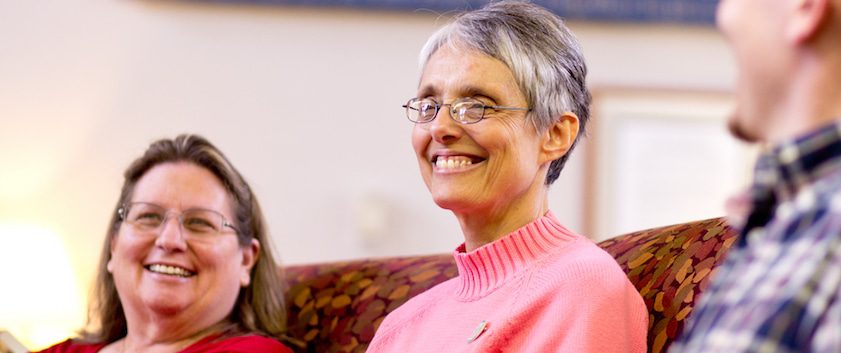
Christian spirituality
Spirituality is a force that animates many to explore their relationship with God. Earlham School of Religion both supports and testifies to the power of lives transformed by spiritual disciplines. Christian spirituality in the Quaker tradition is central to an education that emphasizes not only intellect but self-examination and relationship to the Living Spirit. To serve Christian spirituality students at the highest level, we propose an endowment that will accomplish several key objectives:
- Elevate the spirituality studies faculty position through the creation of a named, endowed faculty chair.
- Support conferences and retreats that promote spirituality on campus and outside the classroom.
- Support a program that provides leadership development with both students and constituents
In Christian terms, truth is discerned by the guidance of the Living Spirit, through the practice of disciplines like prayer, study of Scripture, worship and listening. Spirituality directs us to live in accord with truth.
The emphasis on spirituality has always distinguished Quakers, because the Holy Spirit or the Spirit of Christ is our primary organizing principle. A common understanding of the Bible or theology directs other denominations, while Quakers acknowledge deep dependence on the guidance and power of the Holy Spirit to guide them into relationship with God, and into whatever ministry or vocation they are led.
The Religious Society of Friends and Earlham School of Religion promote educational principles that equally emphasize faith and reason. Elton Trueblood, in a statement for the “Interim Program” of 1960-1962, charged that, “We need places of training in which there can be genuine emphasis upon the development of the inner life of devotion without any diminution of the emphasis on intellectual integrity.” ESR has evolved to become that place.
Today, ESR offers a vibrant spirituality emphasis for M.Div./M.Min. students, as well as a Spirituality Certificate. A growing range of classes, seminars and programming testifies to its importance to the school. The proposed endowment will enable us to continue on this path, and offer:
- A greater variety of intensive classes that will explore topics like Spirituality and Healing, Spirituality in the Wilderness, retreat planning and leadership, spiritual resources for the meeting/congregation. These courses will enhance the residential student experience and provide continuing education for ministers and chaplains
- Stronger Spiritual Direction courses that provide supervisors and small groups for those students wishing to become competent in giving spiritual direction
- Offsets to the cost of the required eight-day spirituality retreat
- Funding for prominent speakers for our annual Spirituality Gathering, as well as more extensive promotion
- A weeklong prayer retreat either on site or at one of several suitable locations across the United States
- Pilgrimage courses to Quaker England or Assisi, Italy, or a Faith Walk for Peace. Offsite semesters in Iona, Scotland, or the Center for Contemplation and Action or at other Quaker wellsprings will present matchless experiences for the participants as well as bring new energy back to ESR.
- Exposure of spirituality courses and events to those outside Quaker meetings and organizations
These queries are provided to help you prayerfully consider whether this major gift proposal is a priority for you as you act as a steward of your resources.
Do you value the influence of an examined faith in acts of ministry and in community leadership?
Do you have concern for the quality of spiritual preparation undertaken by students entering ministry among Friends?
Do you have the means to help Earlham School of Religion build an endowment to support the Christian spirituality program at ESR?
What level of gift are you able to make to manifest this vision for Quaker spirituality?
We offer multiple options for funding this endowment. A donor who chooses to fully fund the endowment will have the option of naming the program.
For more information or to discuss your interest in supporting Christian spirituality studies at ESR contact Tom Decker at 800-432-1377.
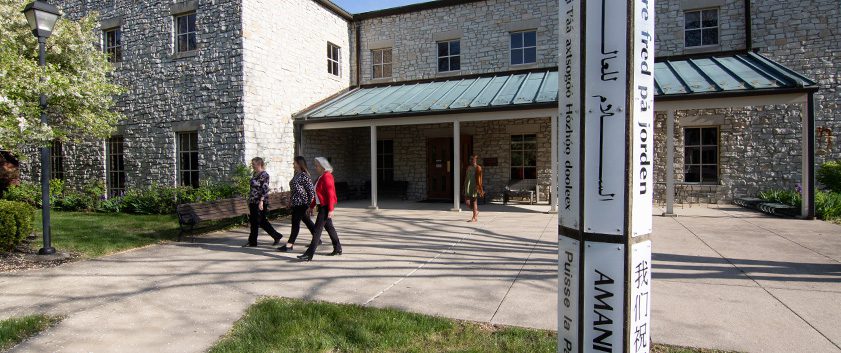
Cross-cultural ministry
Ministry must embrace the complexities and challenges of a multicultural world. Effective ministers must balance communicating with people who have different backgrounds, values and cultural mores, while representing their faith tradition with integrity. Transformation, love and justice are what we can offer a pluralistic world, and are values that motivate this major gift proposal.
This endowment will accomplish these important objectives:
- Establish an ESR cross-cultural ministry office with a part- or full-time employee.
- Allow ESR students to study abroad in order to integrate their studies with cross-cultural immersion and ministry experiences. We wish to do this without inflating tuition.
- Identify and secure sites for students’ travel experiences.
- Create student stipends for the duration of students’ cross-cultural field education
The relationship between minister and those for whom they care is often colored by each person’s differing background, values, sense of community and culture. These aren’t differences to be dismissed, as the call to ministry is a call to a life-long engagement with the world as an empathizer
ESR’s cross-cultural program seeks to nurture the ability to discern these differences, arrive at an accurate understanding of beliefs that motivate others, and communicate clearly and respectfully so that personal connections and empathy occur, rather than misunderstandings
The Association of Theological Schools, ESR’s accrediting agency, includes the issue of globalization among its standards for theological education. Globalization refers to giving curricular attention to cross-cultural issues, providing opportunities for cross-cultural experience, as well as composition of faculty and student body. ESR gives substantial attention to this issue in the classroom in the selection of diverse readings and viewpoints utilized in its courses.
The endowment for cross-cultural ministry will:
- Provide opportunities for service, and learning through service as students offer acts of ministry in this cross-cultural setting.
- Enhance students’ aptitude for ministry by acquainting them with issues that arise in multi-cultural situations and better equipping them with skills for ministry in such settings.
- Promote cultural immersion that nurtures self-awareness, learning adaptability, and making cross-cultural connections.
These queries are provided to help you prayerfully consider whether this major gift proposal is a priority for you as you act as a steward of your resources.
What qualities do we desire today among our emerging leaders?
What is involved in ministering in and to a multi-cultural community?
Can you envision the value of cross-cultural ministry among Friends Meetings and Churches as an aid in the unification of The Society of Friends without muting distinctions those branches have worked to articulate?
Do you have the means to help Earlham School of Religion build an endowment to support cross-cultural ministry at ESR?
What level of gift are you able to make to manifest this vision for ESR’s cross-cultural ministry Program?
We offer multiple options for funding this endowment. A donor who chooses to fully fund the endowment will have the option of naming the program.
For more information or to discuss your interest in supporting cross-cultural ministry at ESR contact Tom Decker at 800-432-1377.

Pastoral care
Pastoral care is an example of “practical theology” that responds to the condition of everyday lives, offers healing, growth and transformation, and creates connections between people and within communities. ESR students engaged in the pastoral care emphasis often go on to serve as chaplains in hospitals and hospices, counselors, and staff members in social service agencies.
The pastoral care endowment focuses on elevating our offerings to these students, and is designed to accomplish these important objectives
- Elevate the pastoral care faculty position through the creation of a named, endowed faculty chair.
- Offer resources and programs in practical theology to unprogrammed Friends meetings, where members and attenders support each other directly through compassionate care
- Create scholarships for current ESR students and recent graduates pursuing professional credentials through clinical pastoral education.
Friends have historically been well prepared for lives of ministry in pastoral care. Bill Ratliff, author of Out of the Silence: Quaker Perspectives on Pastoral Care and Counseling, identifies six aspects of Friends’ faith and practice that inform many Quakers’ work in pastoral care and counseling:
- A quality of deep listening founded on respect for others as sources of God’s truth.
- Flexible care that is not tied to a liturgical tradition but is rather led by the Spirit.
- Practice in spiritual discernment and speaking of difficult truths.
- A heart for justice and openness to naming and critiquing the larger causes of particular problems.
- An understanding that pastoral care is everyone’s concern in the community, not just that of professional caregivers.
- Skill in reflecting on personal experience and relating to the stories of others.
ESR’s pastoral care program helps students learn and discover ways to respond in faith to the events in others’ lives. The program is skills-based – it develops practical knowledge founded on psychology, sociology, and ethics. And, it is rooted in students’ own theological beliefs and their deep understanding of spiritual practices. Students explore and integrate their own sense of self, faith, belief, method, and practice, so that they can be ready to respond with empathy to the needs of others
Pastoral care encompasses several important areas of ministry
- Emergency pastoral care
- Anger, guilt and shame
- Pastoral care in marriage
- Pastoral care with family systems
- Ministry to the dying and their families
- Human sexuality
Students learn how to be present with others at times of crisis; how to connect; how to draw in faith at appropriate times; how to create space for people to reflect, to be comforted and secure, to be invited into holy space. Students learn to walk alongside others who may be filled with grief, fear, anger, or despair. They also learn how to be caring presences in many less intense moments, often by creating an environment in which everyone is encouraged to minister to others.
Clinical pastoral education, or CPE, is one of the most transformative experiences of an ESR education because it is here that theoretical knowledge becomes real. Students are continually challenged to confront questions of life and death, and may find themselves in the presence of God at moments of great power and ministry. They learn to trust in God’s presence, and find the capacity to offer support for others even when under intense duress.
This work happens among individuals, families and communities, and students encounter people from many religious faiths, as well as those who claim no faith at all. By necessity, CPE students develop the ability to work within a wide range of religious expressions, while speaking with integrity from their position of faith. And, Friends’ comfort with silence is often a gift to others when simply being present is most important.
The pastoral care endowment will support scholarship funds to relieve some of the additional financial burden students face while pursuing clinical pastoral education. The funds will be administered on a competitive basis. For current ESR students, the stipend will assist with application fees, tuition for the CPE program, and travel-related expenses like transportation, lodging, and meals. It may also be used for supplies and materials.
For students entering their one-year residencies after graduation from ESR, the competitive scholarship support may be used however it is most needed, including tuition and personal living expenses. Students who pursue CPE often find that taking one more year of schooling beyond seminary creates a significant financial strain. Scholarship support will make a significant difference, relieving strain from students who are themselves preparing for a vocation of helping others.
These queries are provided to help you prayerfully consider whether this major gift proposal is a priority for you as you act as a steward of your resources.
Do you feel called to support the work of caregivers, including ESR students and alumni/ae who become counselors, chaplains, and social workers?
Do you believe ESR could usefully provide workshops, retreats, and other resources about pastoral care and counseling to Friends meetings?
Do you value the education in practical theology received by students at ESR, and would you like to help ensure its future?
Do you have the means to help Earlham School of Religion build an endowment to support the pastoral care program?
What level of gift are you able to make to manifest this vision for Quaker practical theology?
We offer multiple options for funding this endowment. A donor who chooses to fully fund the endowment will have the option of naming the program.
For more information or to discuss your interest in supporting pastoral care at ESR contact Tom Decker at 800-432-1377.
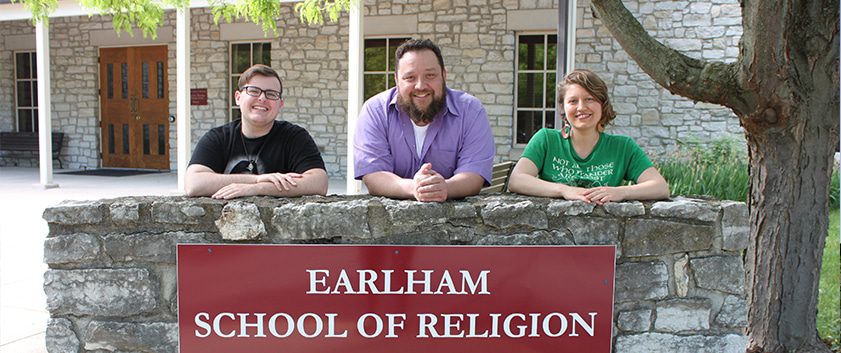
Pastoral ministry
Earlham School of Religion was founded in 1960 to prepare a new generation of Quaker pastors. Many serve as pastors in every Friends United Meeting (FUM) yearly meeting that has pastoral meetings as well as some Evangelical Friends Church International (EFI) yearly meetings. Yet, Friends face a crisis created by a shortage of qualified, well educated, Quaker pastors.
The proposal for a pastoral ministry endowment will accomplish these important objectives:
- Elevate the pastoral studies faculty position through the creation of a named, endowed faculty chair.
- Support an ESR-led discernment assistance program for meetings and Friends responding to calls to ministry.
- Provide continuing education and renewal opportunities for Friends pastors building support networks.
- Solidify the pastoral studies program for perpetuity as a permanent feature of the Master of Divinity program.
Friends accepted pastoral ministry a little more than a century ago, in contrast to other denominations where pastoral ministry and leadership is commonplace. This change transformed pastoral meetings, as a single individual assumed responsibility for a diverse set of tasks. Congregations came to expect pastors to preach, conduct home visitation, provide counseling, connect meetings with their communities, and act as effective administrators. Their expectations sometimes exceeded the skills, education and training offered by their pastors.
Over time, those expectations and seminaries’ preparations of students for pastoral ministry have evolved for the better. Quaker pastors are common to FUM and EFI congregations, where they serve a vital role in helping communities and individuals develop rich lives of faith, an in the formation of religious beliefs and spiritual values.
Yet, Quaker pastors are something of an endangered species. Many lack formal preparation for pastoral ministry, and even more leave the profession after serving for a brief period. This attrition, and the lack of qualified pastoral applicants, leads to Friends meetings filling positions with pastors who are from other faith traditions.
ESR attempts to counter this trend. Pastoral Ministry program graduates, supported by formal preparation for their roles, serve across the world within the structures of meetings and churches. An estimated one-third of our graduates have served meetings and churches in Friends United Meeting affiliated yearly meetings, churches belonging to Evangelical Friends International, and numerous churches in other denominations. Others minister on campuses, as church planters, and through creative forms of ministry like art and writing.
We equip Pastoral Ministry students with a thorough grounding in Scripture, religious history, and other subjects that inform how they understand God, Christ and the Holy Spirit, so that they are faithful and capable interpreters of those stories through preaching, pastoral care and outreach.
We emphasize spiritual maturity. Development of a rich life of the Spirit happens through theological reflection, studying and understanding the authoritative voices of one’s faith tradition, and examination of one’s own experience. Students integrate their discoveries into the fabric of their lives, and seek to articulate these experiences in ways that are understandable and relevant to others.
We stress the formation of a ministerial identity, and help guide students toward avoiding messianic complexes while understanding their special role as an ambassador for God’s work. This is rooted in the sense of self, and influences the values pastors seek to honor.
We nurture students’ relational skills so that they are good listeners and communicators, empathetic to the condition of others, moved toward empowering those around them, and sensitive to the challenges of a pluralistic world.
We develop pastors as leaders. There is no universal leadership style among Friends, so pastors must understand how to exercise effective leadership in the context of the meetings in which they serve. Formal education in the dynamics, methods and skills of leadership is essential.
The pastoral ministry endowment will continue to fund this critical work, and help insure that churches and meetings in the Quaker world and beyond have access to pastoral ministers who have the qualities, formal education and training, skills, and life experience to serve congregations and communities.
These queries are provided to help you prayerfully consider whether this major gift proposal is a priority for you as you act as a steward of your resources.
Do you value the work of the pastor as an expression of ministry among Friends?
Do you have a concern for the quality and the supply of pastoral ministers among Friends?
Do you have the means to help Earlham School of Religion build an endowment to support the pastoral ministry program at ESR?
What level of gift are you able to make to manifest this vision for Friends pastoral education?
We offer multiple options for funding this endowment. A donor who chooses to fully fund the endowment will have the option of naming the program.
For more information or to discuss your interest in supporting pastoral ministry studies at ESR contact Tom Decker at 800-432-1377.
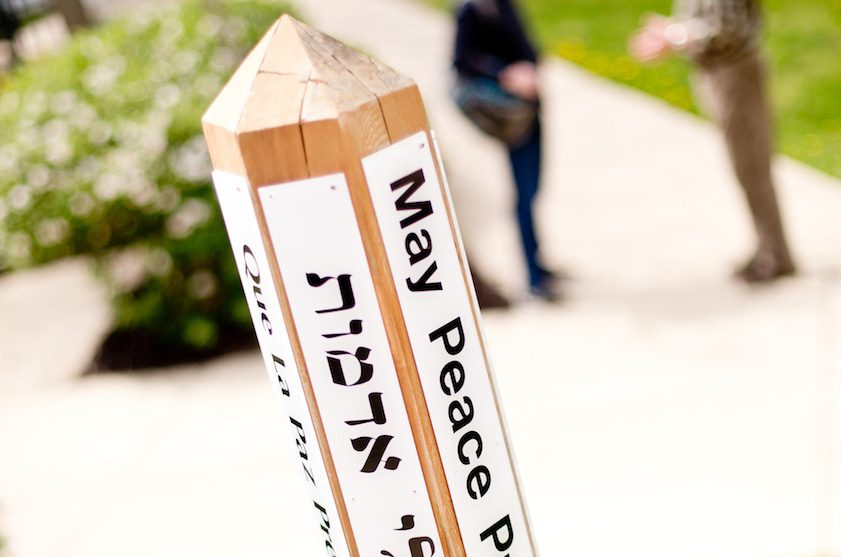
Peace studies
Our world harbors social and political structures that demonstrate a propensity for violence, injustice, and oppression. Religion is not immune to these conditions. In some denominations, nationalism has replaced discipleship and obedience to the Living Christ.
Friends are called to live, proclaim and teach our peace testimony. Throughout our history, ESR has been faithful to that call. The product of that faith includes a vital, practical program of peace studies. Now, perhaps more than ever, peace studies deserve to become an endowed cornerstone of theological education in the manner of Friends.
The peace and justice endowment will accomplish these peacemaking objectives:
- Strengthen the peace studies faculty position through the creation of a named, endowed faculty chair.
- Support a range of peace education activities on and off the Richmond campus.
- Provide continuing education and renewal opportunities for Friends engaged in peacemaking ministries.
- Ensure the future of peace studies as a permanent feature of the Master of Divinity and Master of Arts programs.
George Fox spoke of being changed by Christ. His religious convictions led him to refuse to take up arms, first against the Monarchy, and later for any reason. Some Friends did serve in Oliver Cromwell’s army during the English Civil War, but their refusal to take oaths meant they could not swear allegiance to Cromwell and his movement, as demanded; and their refusal to acknowledge superiority of rank by speech or gesture led to charges of subverting military authority and discipline. From these hardships, Friends began to articulate a position that denied tendencies to war. In 1660 Fox delivered this corporate statement to King Charles:
“We utterly deny all outward wars and strife and fightings for any end or under any pretenses whatsoever. And this is our testimony to the whole world. We do certainly know, and so testify to the world, that the spirit of Christ, which leads us into all Truth, will never move us to fight any war against any man, neither for the kingdom of Christ, nor for the kingdoms of this world.”
Today, the Friends tradition continues to make a compelling argument for a ministry of peacemaking. It understands the complex dynamics that fuel violence, excels in conflict mediation and resolution, and seeks alternatives to violence. Friends peace testimonies call for individual and mutual integrity, the common good, and allegiance to God’s work. They lead us not just toward the cessation of violence, but toward removing all causes for violence in the world.
ESR students are offered the opportunity to study peace and justice in all aspects. We examine religious, economic, social and political factors that foment conflict, violence and injustice. An interdisciplinary approach to peace and justice studies provides students with a Quaker perspective on relevant issues, and prepares them for practical ministry in this area.
Coursework is reinforced by opportunities to explore peace and justice issues outside the classroom. These include:
- Endowed conferences on peace and justice, which successfully connect the school with the wider Richmond community as well as with constituents and other educational institutions around the country. These events draw prospective students, and represent opportunities to grow enrollment.
- Field experience, which provides students with important opportunities to put theoretical knowledge into practice. Our students have protested outside the School of the Americas, receiving insight into the challenges of questioning governmental powers, ideologies, and military commitments. They’ve engaged in dialogue with staff of Friends Committee on National Legislation, learning how faith can work with the hallways of Congress in an effort to influence public policy. Within Conflict Resolution Centers, they have gained the ability to facilitate resolution — and have also made an immediate impact on community groups. These activities, followed by group processing, show students how to act positively for peace while examining their motives, actions, reactions, and results. The endowed program will support the continuation of these off-campus learning opportunities
The world needs people who are committed to the difficult work of bringing individuals, communities, institutions, and governments into a place of peace. ESR has long played an important role in preparing people for this important ministry.
These queries are provided to help you prayerfully consider whether this major gift proposal is a priority for you as you steward your resources.
Do you value the work of peacemaking as an expression of ministry?
Do you have a concern for the spiritual and theological foundations for peacemaking?
Is the support of an educational community that promotes dialogue and practical opportunities for learning about peacemaking a worthy investment?
Do you have the means to help Earlham School of Religion build an endowment to support the peace and justice program at ESR?
What level of gift are you able to make to manifest this vision for Friends peace and justice education?
We offer multiple options for funding this endowment. A donor who chooses to fully fund the endowment will have the option of naming the program.
For more information or to discuss your interest in supporting peace studies at ESR contact Tom Decker at 800-432-1377.
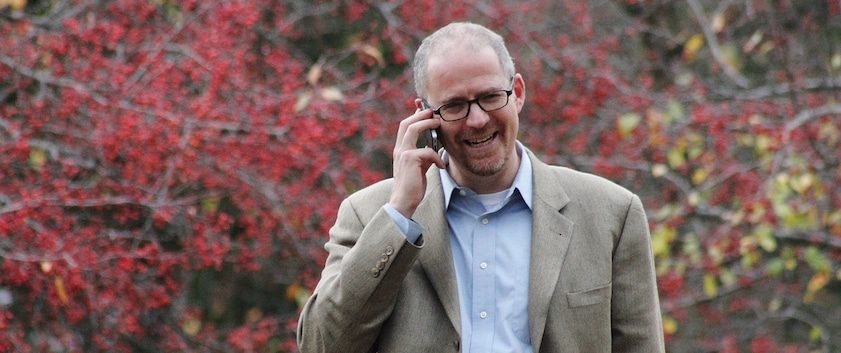
Technology and ministry
Technology has a profound impact on our culture. It connects people and communities with shared interests. It amplifies voices, include those of people who have been marginalized or silenced. It disrupts longstanding economic, educational and political models.
Change of this magnitude raises questions about ethics, interpersonal dynamics, the nature of community, privacy, accountability, and equality. And the pace of change leaves our ability to grapple with these issues far behind the work of technologists, engineers and scientists.
In the midst of this change, we see an important role for ESR not only as an enabler of technology as a tool for ministry, but in engaging in prayerful, Spirit-led discernment into how best to integrate technology into individual lives, communities and society so that it advances our relationships with God and one another in positive ways.
ESR has been resourceful in using technology to create new educational opportunities and deliver important resources to Friends. We wish to accelerate this process. The technology and ministry endowment will meet these critical needs:
- Support technology costs associated with the school’s distance education program, ESR Access.
- Funding to expand the Digital Quaker Collection.
- Support for ESR Publications.
- Ongoing support for technological exploration befitting ESR’s leadership role and mission.
The introduction of ESR Access distinguished the school from its ATS-accredited peers. ESR Access is one of the oldest accredited distance-learning programs offered by seminaries. It is the product of our development of a pedagogically appropriate classes delivered via the Internet. Coursework was originally delivered using Blackboard software; today, we use flexible open source Moodle software, and are expanding our capabilities to deliver audio and video content. Access has allowed us to:
- Extend our programming and service to students who are unable to relocate to Richmond, IN full time.
- Become more family-friendly. We are attractive to older graduate students who have to balance family responsibilities with work and school.
- Support continuing ministry. Some prospective students are already engaged in vital ministries. Requiring their relocation to attend school would disrupt this. By delivering coursework via Access we support students’ educational goals and ministries.
ESR Access demonstrates how the intentional, thoughtful use of technology can grow our reach in the United States and abroad, and support education and ministry among a wide range of students.
Early Friends were often prolific writers. Their epistles, journals, and tracts contain rich wisdom regarding Friends’ spiritual insights. Unfortunately, most of these 17th- and 18th-century works are now out of print. This carries a regrettable consequence: Friends have lost contact with important witnesses to the way members of our tradition understand the life of faith.
With the support of a grant from the Arthur Vining Davis Foundation, ESR created the Digital Quaker Collection, a repository of more than 500 works totaling over 60,000 pages from prominent and less well known Quaker authors. The selected documents detail Quaker theology, spirituality, history, and practice since the inception of the religion in the mid-17th century.
Texts are available in XML and plain text formats. Both simple and powerful search options make this an essential tool for researchers and historians interested in Quaker scholarship. Additional funding will enable us to add new documents and functionality to the Digital Quaker Collection.
Print-on-demand and electronic publishing have lowered barriers to making texts widely available. We no longer have to tie up capital in an inventory of printed books. Instead, we can make titles available according to demand.
To date, we have released several titles:
Twenty-First Century Penn (2004). ESR alumnus Paul Buckley offers in modern English translation five important texts of William Penn, along with extensive footnotes that help illuminate Penn’s meaning.
Where the Wind Blows (2005). Why do some Quaker groups thrive, while others dwindle? Jay Marshall delivers details and insights from an ESR study of vitality among nine Friends meetings and churches.
The Quaker Bible Reader (2006). In this collection of essays edited by Stephen Angell and Paul Buckley, thirteen Friends describe how they read and use the Bible as a resource for their faith.
These initiatives all focus on the idea that technology is an enabler of ministry, and not an end in itself. Each is the product of much thought, discernment and creativity. These queries are provided to help you prayerfully consider whether this major gift proposal is a priority for you as you steward your resources.
Do you think Friends stand to benefit by using technology in appropriate ways?
Can you envision the value to Friends as ESR expands the boundaries of its classroom and community through distance education, workshops, and printed materials?
Do you have the means to help Earlham School of Religion build an endowment to support the Endowed technology and ministry initiative at ESR?
What level of gift are you able to make to manifest this vision for ESR’s technology and ministry initiative?
We offer multiple options for funding this endowment. A donor who chooses to fully fund the endowment will have the option of naming the program.
For more information or to discuss your interest in supporting technology and ministry at ESR contact Tom Decker at 800-432-1377.